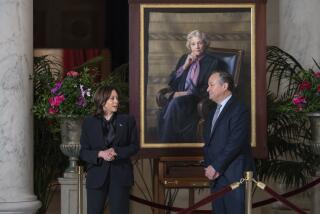Clinton Picks Moderate Judge Ruth Ginsburg for High Court : Judiciary: President calls the former women’s rights activist a healer and consensus builder. Her nomination is expected to win easy Senate approval.
- Share via
WASHINGTON — In a surprise ending to a tortuous three-month search, President Clinton on Monday nominated Ruth Bader Ginsburg, an appeals court judge and former women’s rights activist, as a Supreme Court justice, making her the first appointment to the high court by a Democratic administration in 26 years.
Ginsburg, 60, who serves on the U.S. Court of Appeals for the District of Columbia, was hailed by Clinton in a Rose Garden ceremony. He said that she is a moderate who has “proven herself to be a healer” and consensus builder and who has put her convictions into deeds during a long career as a law professor, advocate and judge.
Clinton, who appeared momentarily moved to tears by Ginsburg’s brief acceptance remarks, said that in her efforts on behalf of women’s rights, Ginsburg “has compiled an historic record of achievement in the finest traditions of American law and citizenship.”
She is known as a cautious interpreter of the law and her selection is expected to add weight to the ascendant center of the court, which includes Justices Sandra Day O’Connor, Anthony M. Kennedy and David H. Souter. Replacing retiring Justice Byron R. White, she will be the second woman on the court and the first Jewish member to hold a seat since Abe Fortas resigned in 1969.
Her nomination is expected to win easy approval in the Senate and most lawmakers greeted her selection with praise or cautious promises to read her record closely.
Senate Minority Leader Bob Dole (R-Kan.) praised her as “a good choice,” while Sen. Orrin G. Hatch of Utah, the ranking GOP member of the Senate Judiciary Committee, which will act first on her nomination, said that she would make “a very excellent justice.”
While some conservative groups gave her at least partial endorsement, liberal and abortion rights groups expressed certain reservations about her views on privacy rights, labor law and even her ability to forge consensus.
Ginsburg, who was asked to take the job Sunday night during an 11:30 p.m. phone call from Clinton, edged out federal appeals Judge Stephen G. Breyer. Her selection came slightly more than a day after disclosures that Breyer had failed to pay Social Security taxes for a retired part-time household worker. The selection ended a search that involved 75 outside lawyers and and the review of 42 candidates, including politicians, judges, practicing lawyers and academics.
But if Ginsburg’s confirmation seems assured, the search has not been without political cost for the President. As candidates have won favor, then lost it almost as quickly, Clinton has been criticized as indecisive or unwilling to stand behind a candidate who might meet with resistance.
One week ago, Interior Secretary Bruce Babbitt’s nomination seemed imminent; then on Friday Breyer was summoned to lunch with Clinton, still nursing a punctured lung suffered in a bicycle accident. Aides asserted Monday that the President’s lengthy deliberations--White resigned three months ago--were attributable only to his wish to make no mistake on what would be a highly visible choice. But Clinton’s sensitivities seemed to be showing when, after the announcement, he responded angrily to a reporter who questioned what had been characterized as the “zig-zag quality” of the search.
Flushed and glaring, Clinton said: “I have long since given up on the thought that I could disabuse some of you of turning any substantive decision into anything but political process.”
How the reporter could even ask such a question after the judge’s impressive remarks “is beyond me,” added Clinton, who then cut off an announced press conference after the single query.
Moments before, during Ginsburg’s remarks, the President brushed away tears when his nominee spoke about how women have struggled to win appointments to the federal bench. She quoted an inscription in her daughter’s 1973 high school yearbook, which said that Jane Ginsburg’s ambition was “to see her mother appointed to the Supreme Court.” The next line read, “If necessary, Jane will appoint her.”
The judge closed her remarks with a touching tribute to her late mother. “I pray that I may be all that she would have been had she lived in an age when women could aspire and achieve and daughters are cherished as much as sons.”
Clinton was said to have sought a moderate who would move slightly to the left a court that often splits, 5 to 4, on contentious issues. He also apparently sought a candidate who would not engender controversy that would cost him political capital in a summer when he is trying to enact his economic program and other parts of his legislative agenda.
Ginsburg, born in Brooklyn, was appointed to the appeals court in 1980 by then-President Jimmy Carter, after serving nine years as a constitutional law and procedures professor at Columbia University. In the years before her appointment, she won a series of Supreme Court cases that sought to end discrimination against women, making a name for herself as a legal pioneer.
Her arguments in one landmark case led the U.S. Supreme Court to rule for the first time that a state law can be ruled unconstitutional if it discriminates against women.
She attended Harvard and Columbia law schools and taught law at Rutgers University in New Jersey before her years as a Columbia professor. As she noted in her remarks, when she graduated from law school women were not in high demand and “not a single law firm in the entire city of New York bid for my employment when I earned my degree.”
Sen. Joseph R. Biden Jr. (D-Del.), chairman of the Senate Judiciary Committee, praised her “impressive record” and said that he will soon schedule confirmation hearings. Those hearings will come after an FBI background check that will take several weeks. Since the Senate recesses Aug. 9 for the remainder of the month, the final vote may not come until September.
The Institute for Justice, a conservative watchdog group, said that it is giving her “cautious support” and praised her moderate views.
But the National Right to Life Committee, an anti-abortion group, accused Clinton of subjecting her to a pro-abortion “litmus test” before naming her. From the other side, the National Abortion Rights Action League said that it looked forward to a hearing that would determine “whether Judge Ginsburg will protect a woman’s fundamental right to privacy.”
People for the American Way, a liberal group, called her “a significant improvement” over other recent nominees, but cited questions about her stands on “access to the courts, privacy rights, and her capacity to forge effective coalitions among justices on the moderate-liberal wings of the court.”
Even before the nomination, one White House aide fretted about the reaction.
“All of our friends in the liberal community are not very excited,” the aide said. This official also contended that White House assertions to the contrary, Breyer’s failure to withhold Social Security taxes for a woman who did occasional housework for him was indeed a factor in the decision not to select him for the post.
The issue of the Social Security taxes first rose with attorney general nominee Zoe Baird and has dogged other candidates for Administration jobs since.
Some liberal groups in Washington have been disappointed that, as an appeals judge, Ginsburg did not live up to their expectations of what she could do as an advocate for the liberal point of view. Indeed, many have noticed with vexation that one of Ginsburg’s closest relationships has been with conservative Justice Antonin Scalia, with whom she sat on the appeals court for five years.
Despite the President’s praise of her skills as a conciliator, some lawyers who have worked with her contend that her manner is aloof, even brusque, and that her style is more independent than collegial.
Although Clinton has often spoken of increasing “diversity” in the federal judiciary, aides said that the choice of a woman, minority or Jewish candidate was not a paramount factor in the selection. Atty. Gen. Janet Reno, however, did push for a female appointee.
Aides said that First Lady Hillary Rodham Clinton, though a lawyer herself, attended only a few of the meetings and was not closely involved in the decision. She did not review the work of Ginsburg, whom she met at the University of Arkansas some years ago, aides said.
Judge Ginsburg is married to Georgetown University Law Center professor Martin D. Ginsburg, who has been a longtime friend of one of Clinton’s chief critics, Ross Perot, and has advised the Texas billionaire on tax matters for nearly 20 years.
Martin Ginsburg represented EDS, Perot’s computer-services company, when it was acquired by General Motors Corp. in 1984, a deal that made Perot a billionaire. He also has advised Perot on a variety of tax and business affairs since the mid-1970s, a Perot associate said.
In gratitude for Ginsburg’s work on the GM acquisition, Perot donated $1 million in 1986 to the Georgetown law school to endow a chair in Ginsburg’s name. School officials said that Ginsburg does not occupy the endowed chair nor does he receive any money as a result of the Perot gift.
White House officials said that they were aware of the Perot-Ginsburg connection but believed it would pose no problem and might be beneficial. Perot recently has been harshly critical of Clinton’s performance as President and is building a political organization that may again challenge the major parties.
White House aides said that Perot had not lobbied for Judge Ginsburg and had not been consulted in advance of her selection.
Ginsburg and her husband, Martin, are financially well off, with between $1.1 million and $2.3 million in cash and investments, according to annual financial disclosure reports she has filed as a judge.
They have conservative investments in municipal bonds and U.S. Treasury bonds with an aggregate value of more than $1 million, the reports show. In addition, Judge Ginsburg has a tax-sheltered individual retirement account and other retirement funds in excess of $300,000, including assets accrued from her law school teaching days.
Times staff writers John M. Broder, Thomas B. Rosenstiel and Robert L. Jackson contributed to this story.
* NOMINATION CONTEST: Delays in selection process benefit eventual nominee. A16
More to Read
Get the L.A. Times Politics newsletter
Deeply reported insights into legislation, politics and policy from Sacramento, Washington and beyond. In your inbox twice per week.
You may occasionally receive promotional content from the Los Angeles Times.









